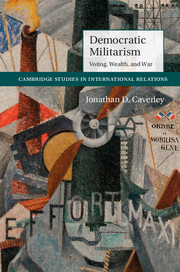Book contents
- Frontmatter
- Dedication
- Contents
- List of figures
- List of tables
- Acknowledgments
- 1 Introduction: sources of democratic military aggression
- 2 Cost distribution and aggressive grand strategy
- 3 Analyses of public opinion
- 4 Analyses of arming and war
- 5 British electoral reform and imperial overstretch
- 6 Vietnam and the American way of small war
- 7 Becoming a normal democracy: Israel
- 8 Conclusion: strategy wears a dollar sign
- Bibliography
- Index
1 - Introduction: sources of democratic military aggression
Published online by Cambridge University Press: 05 July 2014
- Frontmatter
- Dedication
- Contents
- List of figures
- List of tables
- Acknowledgments
- 1 Introduction: sources of democratic military aggression
- 2 Cost distribution and aggressive grand strategy
- 3 Analyses of public opinion
- 4 Analyses of arming and war
- 5 British electoral reform and imperial overstretch
- 6 Vietnam and the American way of small war
- 7 Becoming a normal democracy: Israel
- 8 Conclusion: strategy wears a dollar sign
- Bibliography
- Index
Summary
In wealthy democracies, the preparation for and conduct of military conflict has largely become an exercise in fiscal, rather than social, mobilization. How does this development influence when democracies choose violence as their preferred tool in international politics? When do voters have a moderating influence on foreign policy, and when do they allow or even encourage their leaders to pursue gains through military coercion, even at the risk of overstretch? Why do democracies often pursue a military doctrine ill-suited for the war at hand?
Contemporary political scientists appear optimistic that democracies pursue grand strategies enabling them to be, like George Washington, first in both war and peace. Yet confidence in democracy's superiority at international politics is a relatively recent development. One does not have to look far into the past to see that the current consensus would surprise the more pessimistic appraisals of Cold War thinkers such as Raymond Aron, George Kennan, Walter Lippmann, and Hans Morgenthau. Nor do the classic works of Machiavelli, Rousseau, Kant, and de Tocqueville agree on democracies' relative peacefulness or their ability in war.
Democracies have fought foolish wars, built massive militaries, and have shown a remarkable enthusiasm for imperialism. Democracies account for 17 of the world's 20 largest defense budgets (not counting Russia), with the United States alone responsible for 40 percent of the world's defense spending (SIPRI, 2013b). While these democracies' expenditures remain “affordable” based on the size of their economies, they represent enormous opportunity costs in terms of the provision of domestic public goods or private consumption.
- Type
- Chapter
- Information
- Democratic MilitarismVoting, Wealth, and War, pp. 1 - 20Publisher: Cambridge University PressPrint publication year: 2014

